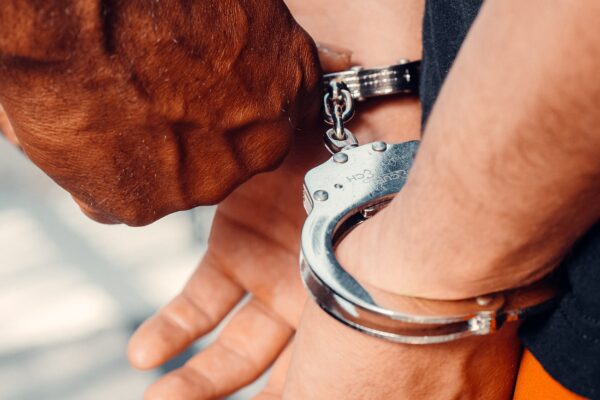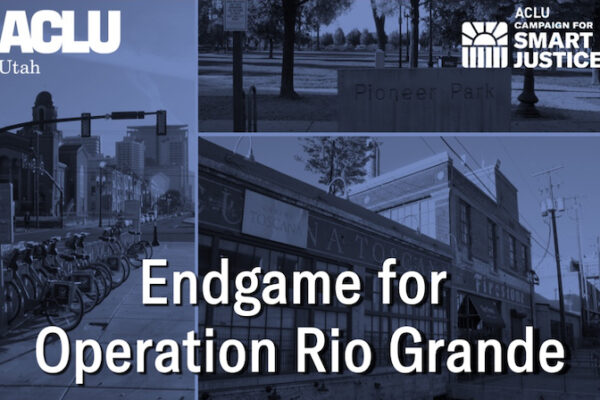FOR IMMEDIATE RELEASE:
August 16, 2017
SALT LAKE CITY, UT — The ACLU of Utah has been asked by some community partners and media representatives to share observations about “Operation Rio Grande,” the multi-agency law enforcement effort launched this week in the Rio Grande neighborhood of Salt Lake City.
We acknowledge that this is a multi-faceted and rapidly-evolving operation, involving many disparate actors (both governmental and private). Not all details regarding the on-going implementation of Operation Rio Grande are available to the ACLU of Utah. This statement includes our reflections at this time only, and should in no way be construed as an in-depth legal analysis or final evaluation of Operation Rio Grande.
Based on our direct observations, input from community activists and conversations with elected officials, “Operation Rio Grande” appears to be, at this point in time, “business as usual.” In its current phase, this operation appears to rely on simply more of the same ineffective attempts to control the complex social issues of poverty, substance use disorder and mental illness through the same traditional mechanisms of our broken criminal justice system.
We have observed some efforts to ameliorate the enforcement-only focus of the first phase of Operation Rio Grande, such as the provision of additional social workers on site in the neighborhood and stated attempts to assist individuals with accessing services as an alternative to arrest. However, we cannot confirm with confidence that individuals will not be arrested or pushed out of the area simply for nuisance offenses such as camping, loitering and public intoxication.
Prior to the “launch” of Operation Rio Grande, the ACLU of Utah was contacted by several different public officials for feedback on various proposed (but not confirmed) elements of the later phases of the operation. We participated in several meetings with various members of the Operation Rio Grande planning team, but the ACLU of Utah was not part of any official planning process.
Details of the effort, in particular the law enforcement efforts deployed thus far, were not shared with us in advance of the first day of action. We did not “sanction” or “approve” any aspects of the Operation undertaken in this phase. At this juncture, it is unclear whether our input will impact any subsequent phases of the Operation. Nonetheless, we appreciate that public officials sought our feedback, and remain hopeful that this feedback will be incorporated as the Operation moves forward.
Operation Rio Grande was initially characterized to the ACLU of Utah as a “larger-scale Operation Diversion.” Operation Diversion was a collaborative effort undertaken by Salt Lake City and Salt Lake County last fall. From our observations so far, the initial phase of Operation Rio Grande is, in fact, quite distinct from Operation Diversion.
The elements of Operation Diversion that received qualified support from the ACLU of Utah last year appear to be largely, if not entirely, absent from Operation Rio Grande thus far. We understand that diversion options in the form of treatment opportunities may be forthcoming; at the moment, however, Operation Rio Grande does not appear to provide any substantive diversion options.
During Operation Diversion, Salt Lake City and Salt Lake County devoted significant time and resources to securing treatment beds for diversion opportunities for individuals arrested over the course of three days of concerted law enforcement action. The law enforcement effort was conducted primarily by Salt Lake City Police Department (in partnership with the Unified Police Department), and, for the most part, involved officers who were familiar with the Rio Grande neighborhood.
Operation Rio Grande leaders have been quite clear that no treatment beds are immediately available for individuals arrested during Operation Rio Grande. Compared to the 52 open treatment beds and 10 detox beds that were immediately available at the outset of Operation Diversion, Operation Rio Grande’s planners have merely promised that 36 treatment beds will be available at some point in the next several weeks. Hundreds of open jail beds, however, were secured in advance of Operation Rio Grande. This sort of prioritization of incarceration conflicts directly with the ACLU of Utah’s work to reform our broken criminal justice system and end mass incarceration.
The Operation Rio Grande law enforcement effort involves seven different agencies from the city, county and state levels. The presence of law enforcement is significantly higher than observed previously during Operation Diversion. State leaders have indicated that they intend to continue this heightened level of enforcement for up to two years. We are concerned about the many costs – monetary and social - associated with such a prolonged law enforcement effort.During Operation Diversion, the city and county allowed dozens of arrested individuals to opt for immediate admission to treatment in order to avoid jail. Individuals who entered treatment immediately were not booked into jail. Arrested individuals were processed in a non-jail facility, with social workers and public defenders on hand for compassionate assessment and consultation. The atmosphere was respectful and offered dignity to those arrested as part of the operation. When arrestees absconded from treatment, the open beds were made available to other needy individuals in the Rio Grande area, who voluntarily entered the Community Connection Center in the neighborhood.
By contrast, individuals arrested through Operation Rio Grande are being booked immediately into the Salt Lake County jail through the same jail processes as any other county arrestee. The County Jail has indicated to us that it has increased staffing to handle as many as 80 additional bookings a day, in addition to the typical 120 bookings per day. Though we have been told that consultations with social workers can and will occur prior to arrest, there is no guaranteed access to treatment or legal representation for these individuals during the arrest or booking processes.Operation Diversion offered an actual diversion option. Individuals who entered and completed substance abuse treatment could avoid charges for, and prosecution of, their drug crimes. It is unclear how Operation Rio Grande will allow for the provision of treatment, and how that treatment will be tied to prosecution.
The ACLU of Utah is particularly concerned about potential arrests for camping and other “nuisance” offenses related to individuals’ status as homeless. We have been assured that Operation Rio Grande is not primarily focused on arresting or citing individuals for nuisance offenses. We sincerely hope that this assurance will bear out.We continue to reiterate to public officials our concerns about proposed “ID cards” for people who require homeless and other services in the Rio Grande area. The ID card proposals that have been mentioned to the ACLU of Utah, so far, are too vaguely-defined for us to provide meaningful assessment at this time. We have provided some input on this topic to elected officials. We hope this feedback will result in a better policy going forward, should the State proceed with the ID card proposal.
We will monitor arrest and booking statistics, as well as review complaints from community members, to assess the criminalization and incarceration impacts of Operation Rio Grande. In the absence of any simultaneous treatment options, we expect those impacts will be much more numerous that any actual, positive diversions from criminal activity or substance abuse.
We remain hopeful that the concerns we raise with elected officials will help shape future efforts as Operation Rio Grande unfolds.
###
Related Content
ACLU of Utah Statement on Operation Rio Grande (UPDATED)
Stay Informed
Sign up to be the first to hear about how to take action.
By completing this form, I agree to receive occasional emails per the terms of the ACLU’s privacy statement.
By completing this form, I agree to receive occasional emails per the terms of the ACLU’s privacy statement.


